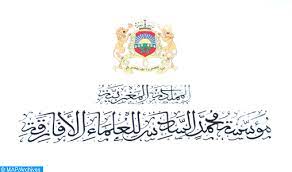
The 5th ordinary session of the Higher Council of the Mohammed VI Foundation for African Ulema has officially launched the Charter of African Ulema (Muslim scholars) during the event, which took place in Fez December 6-7.
The Charter, launched at a ceremony held at the library of Al Qarawiyyin in Fez, serves as a comprehensive reference document, defining the doctrinal path and aligning with the objectives of the Scholars within the Foundation. Functioning as a doctrinal guide, this charter becomes a valuable resource supporting the scientific endeavors of the Mohammed VI Foundation for African Scholars. Its purpose is to safeguard the Scholars and fulfill the Foundation’s overarching objectives.
The Foundation envisions the Charter of African Ulema, whose formulation was decided during the 3rd ordinary session of the Higher Council in December 2019, as a doctrinal document and a fundamental pillar for the collective action of African Scholars. The aim is to achieve the noble goals set by Commander of the Faithful, King Mohammed VI.
The charter, considered a significant communication tool among Ulema and a major reference in the institution’s history, is built upon five balanced and complementary pillars. Its foundational principle is to anchor and consolidate common religious aspects concerning beliefs, doctrines, and behaviors across the African continent.
The launch ceremony was attended by key figures, including Heads of the Mohammed VI Foundation of African Ulema sections in several African countries, the Secretary-General of Morocco’s Higher Council of Ulema, Mohamed Yessef, the Secretary-General of the Rabita Mohammadia of Ulema, Ahmed Abbadi, and the Secretary-General of the Higher Council of the Mohammed VI Foundation for African Ulema, Mohamed Rifki.
The Higher Council of the Mohammed VI Foundation for African Ulema also decided during this session to kick off the African Muftis Council platform, alongside other projects and activities slated for 2024.
This platform aims to strengthen ties between religious scholars in Morocco and their counterparts in other African countries, as it is designed to explain Islamic principles to the faithful, emphasize Islamic values, and guide the work of muftis using scientific principles and rules.
This digital tool aims to showcase the rich Muslim heritage concerning fatwa issues, printing and publishing fatwa works across African countries.
The platform will facilitate exchanges between the faithful and African muftis, exchange of experiences among African researchers in fatwa science through digital media, popularize manuscripts on fatwa in Africa, and raise awareness of the efforts of the Mohammed VI Foundation for African Scholars while contributing to developing communication means for Muslims.
The Foundation’s four permanent commissions, covering Scientific and Cultural Activities, Sharia Studies, Revitalization of African Islamic Heritage, and Cooperation and Partnership, have greenlighted various projects.
Primarily, the commissions are focusing on launching WEBTV, a digital television channel pertaining to the Mohammed VI Foundation for African Ulema. This channel will broadcast scientific programs, training and awareness sessions, debates, as well as educational programs targeting illiteracy, Arabic language teaching, and training for imams and preachers.
The commission responsible for revitalizing African Islamic heritage has also given the nod to creating a digital library for the Mohammed VI Foundation for African Scholars.
They have additionally approved launching an encyclopedia covering scholars, works, and Islamic civilizational monuments in Africa. This includes authenticating manuscripts from African heritage and organizing training sessions and conferences on the subject.
Among the greenlit projects are the organization of an international scientific symposium on the Commandery of the Faithful’s efforts to enhance communication between scholars in Morocco and other African countries.
This project goes in addition to the fifth edition of the Holy Quran memorization and recitation competition organized by the Mohammed VI Foundation for African Ulema, and the inaugural Hadith competition by the Foundation.
The Mohammed VI Foundation for African Ulema was set up in 2016 as a new milestone in Morocco’s efforts to disseminate its Islam of the middle path, a doctrine based on tolerance, intercultural dialogue and respect of other faiths.
The academic institution, set up at the initiative of King Mohammed VI, was meant to enhance further the special religious and cultural ties existing between Morocco and African countries, and to be a forum where Ulema from Morocco and other African States can discuss the Islamic thought, and to unify and coordinate their efforts to disseminate the values of tolerant Islam.
